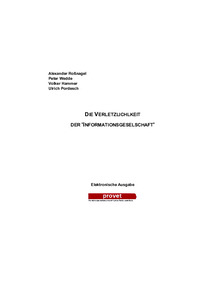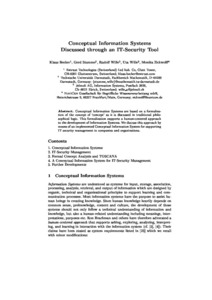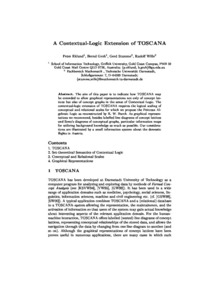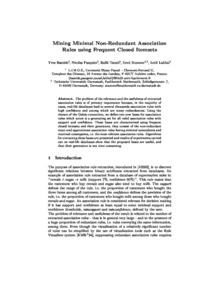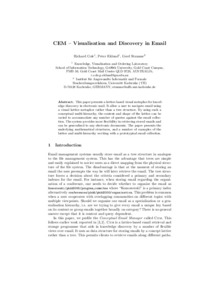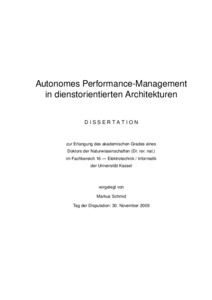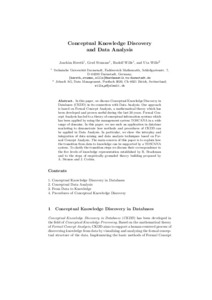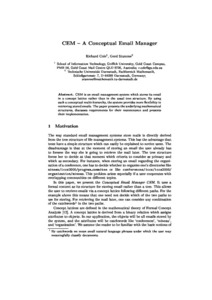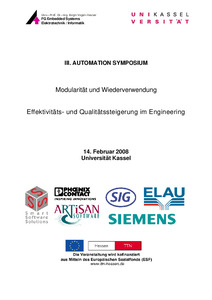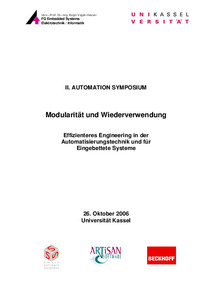Suche
Anzeige der Dokumente 1-10 von 93
Buch
 Die Verletzlichkeit der "Informationsgesellschaft"
Die Verletzlichkeit der "Informationsgesellschaft"
(Westdeutscher Verlag, Opladen, 2002)
Aufsatz
 Conceptual information systems discussed through an IT-security tool
Conceptual information systems discussed through an IT-security tool
(2000)
Conceptual Information Systems are based on a formalization of the concept of "concept" as it is discussed in traditional philosophical logic. This formalization supports a human-centered approach to the development of Information Systems. We discuss this approach by means of an implemented Conceptual Information System for supporting IT security management in companies and organizations.
Aufsatz
 A contextual-logic extension of TOSCANA
A contextual-logic extension of TOSCANA
(2000)
The aim of this paper is to indicate how TOSCANA may be extended to allow graphical representations not only of concept lattices but also of concept graphs in the sense of Contextual Logic. The contextual-logic extension of TOSCANA requires the logical scaling of conceptual and relatioal scales for which we propose the Peircean Algebraic Logic as reconstructed by R. W. Burch. As graphical representations we recommend, besides labelled line diagrams of concept lattices and Sowa's diagrams of conceptual graphs, particular ...
Aufsatz
 Mining minimal non-redundant association rules using frequent closed itemsets
Mining minimal non-redundant association rules using frequent closed itemsets
(2000)
The problem of the relevance and the usefulness of extracted association rules is of primary importance because, in the majority of cases, real-life databases lead to several thousands association rules with high confidence and among which are many redundancies. Using the closure of the Galois connection, we define two new bases for association rules which union is a generating set for all valid association rules with support and confidence. These bases are characterized using frequent closed itemsets and their ...
Aufsatz
 CEM - visualization and discovery in Email
CEM - visualization and discovery in Email
(2000)
This paper presents a lattice-based visual metaphor for knowledge discovery in electronic mail. It allows a user to navigate email using a visual lattice metaphor rather than a tree structure. By using such a conceptual multi-hierarchy, the content and shape of the lattice can be varied to accommodate any number of queries against the email collection. The system provides more flexibility in retrieving stored emails and can be generalised to any electronic documents. The paper presents the underlying mathematical ...
Dissertation
 Autonomes Performance-Management in dienstorientierten Architekturen
Autonomes Performance-Management in dienstorientierten Architekturen
(2009-12-21)
Die Bedeutung des Dienstgüte-Managements (SLM) im Bereich von Unternehmensanwendungen steigt mit der zunehmenden Kritikalität von IT-gestützten Prozessen für den Erfolg einzelner Unternehmen. Traditionell werden zur Implementierung eines wirksamen SLMs Monitoringprozesse in hierarchischen Managementumgebungen etabliert, die einen Administrator bei der notwendigen Rekonfiguration von Systemen unterstützen. Auf aktuelle, hochdynamische Softwarearchitekturen sind diese hierarchischen Ansätze jedoch nur sehr eingeschränkt ...
Aufsatz
 Conceptual knowledge discovery and data analysis
Conceptual knowledge discovery and data analysis
(2000)
In this paper, we discuss Conceptual Knowledge Discovery in Databases (CKDD) in its connection with Data Analysis. Our approach is based on Formal Concept Analysis, a mathematical theory which has been developed and proven useful during the last 20 years. Formal Concept Analysis has led to a theory of conceptual information systems which has been applied by using the management system TOSCANA in a wide
range of domains. In this paper, we use such an application in database marketing to demonstrate how methods and ...
Aufsatz
 CEM - a conceptual Email manager
CEM - a conceptual Email manager
(2000)
CEM is an email management system which stores its email in a concept lattice rather than in the usual tree structure. By using such a conceptual multi-hierarchy, the system provides more flexibility in retrieving stored emails. The paper presents the underlying mathematical structures, discusses requirements for their maintenance and presents their implementation.
Verschiedenartige Texte
 Modularität und Wiederverwendung
Modularität und Wiederverwendung
(2008-03-26)
Vorträge / Präsentationen des Automation Symposiums 2008
Verschiedenartige Texte
 Modularität und Wiederverwendung
Modularität und Wiederverwendung
(2006-11-06)
Tagungsband - Vorträge vom Automation Symposium 2006

